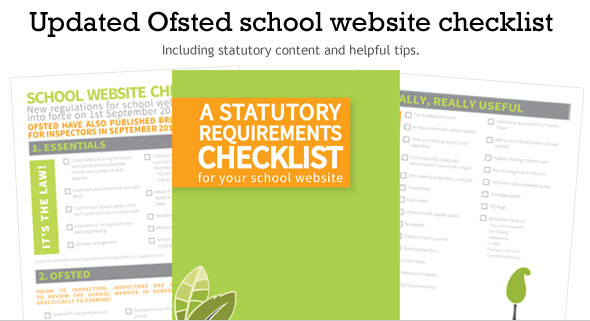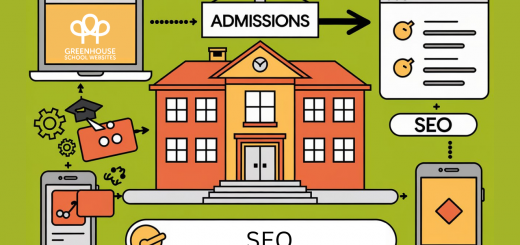School website requirements November 2020

On November 12th, the DfE dropped a major update to their guidance on what maintained schools must publish online, which for nearly every school means what they must publish on their school website.
We’ve been through the updated guidance line by line and compared it to the previous guidance to analyse the changes.
Rather than just regurgitate the guidance which anyone can do, we’ve highlighted the changes for you below. We’ve split the changes between new requirements and clarifications to existing guidance.
We’ve also updated our free checklist for schools which includes all the statutory requirements as well as some suggested things to add to your website which we know parents really appreciate.
We’ve identified that the following sections have changed and we’ve detailed the changes section by section below.
New requirement – Admissions appeals
New requirement sort of – Exams and assessment results
New requirement – Key stage 5 headline measures
New requirement – Coronavirus (COVID-19) catch-up premium
Clarifications – Key stage 2 results
Clarifications – Key stage 4 results
Clarifications – Pupil premium
Clarifications – Year 7 literacy and numeracy catch-up premium
Clarifications – PE and sport premium for primary schools
Clarifications – Special educational needs and disability (SEND) information
Clarifications – School complaints
Clarifications – Governors’ information and duties
Clarifications – Equality Objectives
Clarifications – Curriculum
New requirements
Admissions appeals
There is a new section with explicit guidance for publishing your admissions appeals process.
You must also publish a timetable for organising and hearing admission appeals for your school by the 28 February each year.
This must:
- include a deadline for lodging appeals which allows those making an appeal at least 20 school days from the date of notification that their application was unsuccessful to prepare and lodge their written appeal
- include reasonable deadlines for those making an appeal to submit additional evidence, for admission authorities to submit their evidence and for the clerk to send appeal papers to the panel and parties
- ensure that those making an appeal receive at least 10 school days’ notice of their appeal hearing
- ensure that decision letters are sent within 5 school days of the hearing wherever possible
Exam and assessment results
This is more of a non-requirement however there is an explicit instruction to continue to publish any 2018 to 2019 performance measures in the meantime and mark them as not current.
Schools are not required to publish their exam and assessment results from 2019 to 2020 academic year as these have not been published as performance measures by the Secretary of State. You must, however, continue to display your 2018 to 2019 performance measures until new performance measures are published. You should clearly mark that these performance measures are not current. There’s further information on school and FE accountability expectations for the 2019 to 2020 academic year.
Key stage 5 (16 to 18) information
Rather than just a link to the performance tables as required previously, you must now publish headline measures on your website.
If your school operates a sixth form, you must publish the following details from your school’s 16 to 18 performance tables page most recent key stage 5 (16 to 18) performance measures 16 to 18 accountability headline measures guidance as published by the Secretary of State (for most schools, the performance measures published for the 2018 to 2019 academic year):
- progress
- attainment
- English and mathematics progress
- retention
- destinations
Further changes to exams and assessment results requirements appear under “Clarifications” below.
Coronavirus (COVID-19) catch-up premium
If your school gets the coronavirus (COVID-19) catch-up premium grant in academic year 2020 to 2021, you should publish details of:
- how it is intended that the grant will be spent
- how the effect of this expenditure on the educational attainment of those pupils at the school will be assessed
Read further information on the coronavirus (COVID-19) catch-up premium.
Clarifications
Key stage 2 (end of primary school) results
Clarification that the most recent results will be for the 2018 to 2019 academic year.
average progress scores in reading, writing and maths
changed to
progress scores in reading, writing and maths
percentage of pupils who achieved a high level of attainment in reading, writing and maths
changed to
percentage of pupils who achieved at a higher standard in reading, writing and maths
Key stage 4 (end of secondary school) results
Clarification that the most recent results will be for the 2018 to 2019 academic year.
percentage of pupils who achieved a strong pass (grade 5 or above) in English and maths at the end of key stage 4
changed to
attainment in English and maths – percentage of pupils achieving a grade 5 or above in GCSE English and maths
We suggest that schools also publish the percentage of students staying in education or going into employment after key stage 4 (pupil destinations).
changed to
We suggest that schools also publish percentage of pupils that enter the English Baccalaureate (EBacc) staying in education or going into employment after key stage 4 (pupil destinations).
Pupil premium
Pupil premium strategy templates are now available on the DfE website rather than a link being provided to the Teaching Schools Council website.
Additional guidance:
You may wish to plan your pupil premium use over 3 years. You should aim to update the online strategy statement by the end of the autumn term each year to reflect your plans for the academic year after assessing the needs of your pupils, both new and existing.
Additional guidance acknowledging the difficulty of reporting impact for 2019 to 2020:
We understand that evaluating the pupil premium’s impact in the 2019 to 2020 academic year will present difficulties as a result of reduced numbers of pupils having attended between March and July 2020.
Instead, schools may wish to monitor and report on the grant’s impact at the end of the current financial year, bearing in mind their duty to update this information at least annually, covering the whole period since September 2019.
Year 7 literacy and numeracy catch-up premium
What you must publish if you received payments for 2019 to 2020 has been reduced to 2 items:
- details of how you spent your allocation for that year
- how your use of that allocation made a difference to the attainment of the pupils who benefit from the funding
A note has been added that 2020 to 2021 is the last year which schools must report on.
PE and sport premium for primary schools
Some minor clarifications and scope widening.
the effect of the premium on pupils’ PE and sport participation and attainment
changed to:
the impact the school has seen on pupils’ PE, physical activity, and sport participation and attainment
Special educational needs and disability (SEND) information
This section has been re-ordered and some minor additional clarification added but the requirements remain substantially the same.
section 6 of the Special educational needs and disability code of practice: 0 to 25 years.
changed to:
(Statutory guidance on this is contained in section 6.79 to 6.82 of the Special educational needs and disability code of practice: 0 to 25 years)
School complaints procedure
Added clarification that any arrangements for handling complaints from parents of children with SEND about the support the school provides should be published as part of your SEND Information report.
Governors’ information and duties
Added clarification that information must be:
in line with the constitution of governing bodies of maintained schools statutory guidance.
Not a new requirement but a new explicit reminder that the statutory guidance requires that you:
should also publish the same information for associate members making it clear whether they have voting rights on any of the committees to which they have been appointed.
Equality Objectives
A reminder that you must comply with the Equality Act 2010 (Specific Duties and Public Authorities) Regulations 2017 (2011 in the previous guidance), though the requirements have not changed.
Additional examples of how to comply have been added:
The Equality Act 2010 and Advice for Schools provides information as to how your school can demonstrate compliance, for example, including details of how your school is:
- eliminating discrimination (see the Equality Act 2010)
- advancing equality of opportunity – between people who share a protected characteristic and people who do not share it
- consulting and involving those affected by inequality, in the decisions your school or college takes to promote equality and eliminate discrimination (affected people could include parents, pupils, staff and members of the local community)
Curriculum
A should, not a must, but a new note nonetheless:
Your approach to the curriculum should also include how you are complying with your duties in the Equality Act 2010 and the Special Educational Needs and Disability Regulations 2014 about making the curriculum accessible for those with disabilities or special educational needs.

Download your FREE Statutory requirements checklist
Source:
What maintained schools must publish online
https://www.gov.uk/guidance/what-maintained-schools-must-publish-online
Updated 12 November 2020













